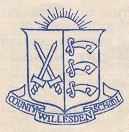|
Saturday September 2nd 1939 was the
day when the school was evacuated to Northampton. This bald
statement describes the end of weeks and days of planning and rehearsals
that preceded this exercise. Those who were going - it was entirely
voluntary - had several rehearsals of collecting at the school and then
marching to Willesden Junction station from which they would be entrained
and sent to .... no one knew where. Not even on the actual day, nor
even on the journey.
They were destined for Northampton as
was Kilburn Grammar, Brondesbury and Kilburn High School. At 9.30 am
the long crocodiles of evacuees, ranked according to size and equipped
with carrier bags containing an orange, apple, biscuits, lemonade and
sweets walked to Willesden Junction. J. McGrath wrote that he had
never enjoyed such luxury before, and had never been on a train. He
had with him 5 younger brothers and sisters for whom this 13 year old was
to be responsible. At the station they were entrained, arriving at
Northampton at 2 pm. One of the trains with KGS evacuees leaving
from Queens Park station went to Market Harborough by mistake. It
took several weeks before they rejoined the main school.
On arrival they were taken to the
Barry Road School, given some food and then the "Meat Market" began.
The luckier ones were chosen with some enthusiasm, but as the day wore on
more reluctant foster parents were being found. Eventually, late at
night, the remainder were billeted on less than enthusiastic townsfolk.
McGrath remembered his little brother and himself crying themselves to
sleep. Strong, loving and lifelong relationships were sometimes
formed between evacuees and foster parents. Arthur Revitt from
Northampton wrote to enquire for two girls who had been billeted on and
cherished by his mother. Others experienced indifference, or even
violence at the hands of their landlords and ladies. The host
parents themselves found the Grammar school children "different" from what
they had expected. Some could relate to them as they might have done
to their own children. Others thought them stuck up. Some of
them only took them in for the 7/- a week they were paid. While some
of the poorer evacuees found themselves in unaccustomed luxury, others
were surprised to find that their billets had no bathrooms.
Housing for the schools themselves
wasn't easy, but the solution was to divide all the evacuated schools'
pupils by sex, and split the school day into two, in order to use existing
buildings. The boys had the afternoon shift from 1.55-5.50 pm at the
Town and County, the host school getting the morning shift, while the
girls similarly shared the Derngate School, a Georgian Building. In
the morning the school met at a Church Hall for sports, art, music and in
this way very little was lost from the syllabus. At first Miss
Jarvie headed the girls school and Mr. Wallis the boys, but this changed
latterly, with staff travelling between Northampton and London to meet the
fluctuating demands of staffing two schools. There was also a club,
the Youth House, established and run by Don Woodman of KGS, and a Hostel
staffed by Mr. and Mrs Parker which offered accommodation for visiting
parents and staff, as well as a haven for pupils.
There was a shifting round between
billets, and also home to Willesden. Some youngsters went home for a
holiday, others permanently when homesickness got too much. The end
of the "Phoney War" period brought a lot of the evacuees home again, and
with the Blitz a second wave descended on Northampton. Yet the whole
story of the Evacuation is not of the school being there for the duration.
Not all left with the school in the first place. There were some who
had their education prematurely curtailed by the evacuation of the school.
Others lost a lot of schooling while the authorities caught up with the
problem. Then there was those returning, and after a year, a whole
new intake of first-years with nowhere to go. Initially those at
home were offered education in the safety of Wembley schools not evacuated
because they were deemed to be out of the likely Blitz area. By 1940
the school re-started in Willesden, with those electing to stay in
Northampton continuing till 1944 in a joint evacuated, coeducational
school entitled "Middlesex Secondary School in Northampton".
Like all War experiences, for some it
was a time of misery and others a great adventure. Staff and pupils
were drawn much closer together, and some learnt to enjoy self reliance
and independence at an earlier age than usual. In a newspaper
interview Miss Jarvie talked of the spirit of the time as being "making
the best of it". This sounds a little like the sound of one hand
clapping, but the school emerged stronger than ever from what was
initially a rather Heath Robinson exercise in moving school populations to
safety.
Thanks to Evelyn Walker and the late J.
McGrath who wrote essays on their experiences. Also thanks to M.W.K.,
who wrote an account in the School Magazine Silver Jubilee Edition
1949/50, and to Michael Brilliant of KGS, who provided an account of his
school's wartime history. Also thanks to Tony Cobb (Bell), Grahame
Smith, Eric Sklar and Arthur Revitt of Northampton.
Sue Bartlet
Ex Editor Old Uffs Magazine |
